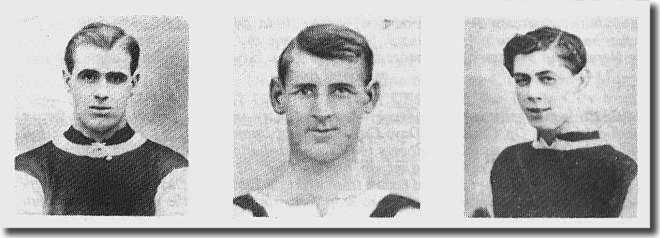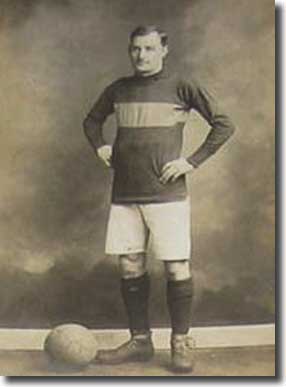 After
the long and dark days of the First World War,
the new Football League season was eagerly awaited and commenced on 30
August 1919. Leeds City kicked off along with all the others, but were
in the midst of some fairly sensational problems as what became infamously
known as The Leeds City Scandal
began to unfold.
After
the long and dark days of the First World War,
the new Football League season was eagerly awaited and commenced on 30
August 1919. Leeds City kicked off along with all the others, but were
in the midst of some fairly sensational problems as what became infamously
known as The Leeds City Scandal
began to unfold.
The bulk of the pre-war squad was still around, including goalkeeper
Willis Walker, full backs George Affleck and Jack Hampson, half backs
Tommy Lamph and Mick Foley and forwards Arthur Price, Billy McLeod, Simpson
Bainbridge, Ivan Sharpe, John Edmondson and Ernie Goodwin, as was the
esteemed manager Herbert Chapman.
The club had also brought in new players, forwards Billy Kirton, William
Short and Herbert Lounds, centre half William Hopkins and full back Harry
Millership, so there were high hopes among the supporters.
As City began to assemble their playing staff ready for the 1919/20 season,
the renewal of Charlie Copeland's contract was considered. Before the
war, Copeland received £3 a week with a £1 weekly increase when he played
in the first team. The board had now offered Copeland £3 10s (£3.50) for
playing in the reserves, and considerably more if he played for the first
team, or they would release him on a free transfer.
The disgruntled Copeland demanded £6 a week and rocked the club by stating
that if he did not get the cash, then he would report City to the Football
Association and the Football League for making illegal payments to players
during the war. City's directors felt they were being blackmailed. At
the risk of forcing Copeland's hand, they ignored his demands and gave
him a free transfer to Coventry. Copeland, who had got hold of certain
documents or at least knew of their contents, carried out his threat in
July 1919 and revealed the alleged irregularities to the authorities.
Bromley was also Copeland's solicitor and, though he strenuously denied
it, the club's directors had strong suspicions that it was he who was
feeding Copeland the information which proved so sensitive.
Following Copeland's allegations, the Football Association and the Football
League set up a joint inquiry into the matter. The Commission, chaired
by FA chairman, J C Clegg, summoned the club to Manchester on 26 September
1919, to answer the charges. City were represented by Alderman Clarke,
who was asked to present the club books before the inquiry.
The Commission, which included a dozen members of the Football Association
and the Football League, as well as members of the international selection
committee, were stunned when City replied that it was not in their power
to do so. Immediately, the inquiry ordered City to produce the documents
by 6 October or face the consequences.
Despite all this off-field controversy, Leeds City had made a solid start
to their new campaign and not even the players could have guessed what
was in store as they set off to play Wolverhampton two days before the
deadline. Because of a rail strike the team went to Molineux by charabanc
and won 4-2, with ace marksman Billy McLeod netting a hat-trick. On the
way home, the City coach gave several stranded people a lift back to the
North and among them was none other than Charlie Copeland.
The trip to Wolves was to be City's last game. The Commission's deadline
came and went with no sign of the documents, so the following Saturday's
fixture against South Shields was suspended and after a meeting of the
inquiry team at the Russell Hotel in London, City were expelled from the
Football League and disbanded.
League chairman John McKenna announced: "The authorities of the game
intend to keep it absolutely clean. We will have no nonsense. The football
stable must be cleaned and further breakages of the law regarding payments
will be dealt with in such a severe manner that I now give warning that
clubs and players must not expect the slightest leniency."
An FA order formally closed the club, leaving everyone associated with
Leeds City shocked and uncomprehending, the unfortunate players out of
a job and City officials to face further punishment.
Although there had been no concrete evidence of the alleged illegal payments,
City's silence - whether to protect themselves or a misguided move to
shield players - was deemed to be admission of guilt.
Not even the personal intervention of the Lord Mayor of Leeds, Alderman
Joseph Henry, who offered to take over the club from the directors, could
persuade the inquiry to reconsider and League football came to a halt
in Leeds after just eight games of the 1919/20 season.
Five City officials were banned for life - Connor, Whiteman, fellow directors
Mr S Glover and Mr G Sykes and, rather surprisingly, manager Herbert Chapman.
The board promptly resigned, but Chapman earned a reprieve after evidence
was later given that he was working at the munitions factory when the
illegal payments were allegedly made.
Connor complained that City were not given a fair hearing by the inquiry
and Alderman Henry also believed that Burslem Port Vale - the club who
had replaced City in the Football League - had brought undue pressure
to bear on the inquiry team, in an effort to get City thrown out, so they
could take their place.
Port Vale inherited City's playing record of Played 8, Won 4, Drawn 2,
Lost 2, Goals For 17, Goals Against 10, Points 10. They completed City's
remaining fixtures and finished in 13th place.
Bob Hewison, a guest player with City during the war, was asked by the
inquiry to act as secretary during the  winding
up of the club, a job he tackled while recovering from a broken leg sustained
in 1918/19. Also helping to sort out the tattered remnants of the club
were Alderman Henry and Leeds accountant W H Platts.
winding
up of the club, a job he tackled while recovering from a broken leg sustained
in 1918/19. Also helping to sort out the tattered remnants of the club
were Alderman Henry and Leeds accountant W H Platts.
Hewison later became Bristol City manager, and became embroiled in another
illegal payments scandal. On 15 October 1938, another joint Football Association
and Football League inquiry into payments made to amateur players fined
Bristol City 100 guineas and suspended Hewison until the end of the season.
Biggest victims of the Leeds closure were the players. The Football League
promised to pay their wages until they could get fixed up with new clubs
and the best way to find them new employers was considered to be by auction,
which was duly held at the Metropole Hotel in Leeds on 17 October. Representatives
from 30 League clubs turned up to haggle over Leeds City's erstwhile assets.
It was a humiliating experience for the players as they were sold off
along with the club's nets, goal-posts, boots, kit and physiotherapy equipment.
The entire squad fetched less than £10,150, with fees fixed at figures
from £1,250 (for star player McLeod) to £100 after would-be purchasers
complained that the original prices were set too high. The Football League,
who were responsible for organising the sale, said that no player should
be made to join any club he did not want to but, with the players anxious
to get back into the action as quickly as possible, the other clubs clearly
held the whip hand.
'A melancholy spectacle' was the Yorkshire Post description, reporting
the prices as if it were some livestock auction: Billy McLeod (to Notts
County) raised £1,250; Harry Millership (Rotherham) and Jack Hampson
(Aston Villa) each for £1,000; Willis Walker (South Shields), Tommy Lamph
(Manchester City) and John Edmondson (Sheffield Wednesday) went for £800;
William Hopkins (South Shields) for £600; George Affleck (Grimsby), Ernest
Goodwin (Manchester City), Billy Kirton (Aston Villa), William Ashurst
(Lincoln City) for £500; Fred Linfoot
(Lincoln City) and Herbert Lounds (Rotherham) for £250; Arthur
Wainwright (Grimsby) and William Short (Hartlepool United) for £200;
Francis Chipperfield (Lincoln City) £100.
Looking back on the entire shabby episode some years later, John McKenna
revealed he had some sympathy with the plight in which Leeds City found
themselves trapped: "Perhaps others have escaped being found guilty of
malpractices, but if they are found out now we shall not stand on ceremony
or sentiment."
However, just as the history of Leeds City came to an abrupt and infamous
conclusion, things took a new twist. Moves were under way to create Leeds
United, a new club which would (eventually) rise triumphantly from the
ashes of this whole sorry affair.
Other Football Highlights from 1919/20
- With 42 matches instead of 38, it was not surprising that the points
records for both divisions of the Football League were broken, West
Bromwich Albion winning the league title with 60 points and Spurs the
Second Division with a massive 70. Both scored over 100 goals and West
Brom's 104 is a record for the top division
- Aston Villa won the FA Cup for a record sixth time. At its new venue,
Stamford Bridge, the match went to extra time before Villa beat Huddersfield
1-0 with a goal scored by inside-right Billy Kirton, a converted full-back
whom Villa had picked up for £250 in the auction of Leeds City
players in October
- England came back from 4-2 down at half time to beat Scotland 5-4
at Hillsborough, but in so doing they handed the Home International
Championship to Wales
back to top












 After
the long and dark days of the First World War,
the new Football League season was eagerly awaited and commenced on 30
August 1919. Leeds City kicked off along with all the others, but were
in the midst of some fairly sensational problems as what became infamously
known as The Leeds City Scandal
began to unfold.
After
the long and dark days of the First World War,
the new Football League season was eagerly awaited and commenced on 30
August 1919. Leeds City kicked off along with all the others, but were
in the midst of some fairly sensational problems as what became infamously
known as The Leeds City Scandal
began to unfold. winding
up of the club, a job he tackled while recovering from a broken leg sustained
in 1918/19. Also helping to sort out the tattered remnants of the club
were Alderman Henry and Leeds accountant W H Platts.
winding
up of the club, a job he tackled while recovering from a broken leg sustained
in 1918/19. Also helping to sort out the tattered remnants of the club
were Alderman Henry and Leeds accountant W H Platts.